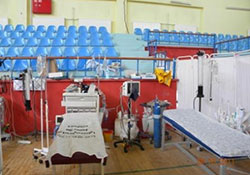Ответные действия

WHO
How does the UN define response?
The United Nations International Strategy on Disaster Reduction defines response as “the provision of emergency services and public assistance during or immediately after a disaster in order to save lives, reduce health impacts, ensure public safety and meet the basic subsistence needs of people affected”.
What is WHO’s role?
Along with other international organizations and nongovernmental organizations (NGOs), WHO/Europe works with local authorities, civil society and international partners in responding to the health needs of people threatened by a disaster.
WHO leads the Inter-Agency Standing Committee (IASC) global health cluster, a partnership between United Nations agencies, international organizations and NGOs working for health. Based on a joint workplan, the health cluster serves as an effective platform for coordinating humanitarian health action in emergencies. In the European Region, it has been activated for the North Caucasus, Georgia and Tajikistan.
An effective health response requires:
- Health intelligence:
-
- understanding what is happening, when and how different groups of people are affected;
- concentrating on mortality and its causes; vital needs and systems; communicable disease, the health of women, children and older people; nutritional status; mental health; and access to essential care, including care for chronic conditions;
- Health coordination:
-
- convening technical, logistic and support teams for an optimal response;
- drawing on the best national and international expertise;
- supporting country capacity and focusing on essentials such as assessment, outbreak response, repairing and jump-starting critical services, tracking progress and coordinating actors;
- establishing the essential health actions that are immediately needed;
- anticipating long-term needs, and the conditions under which they should be met;
- offering standardized tool kits and techniques for assessment, for organizing and coordinating response, and supporting the recovery of local systems.



